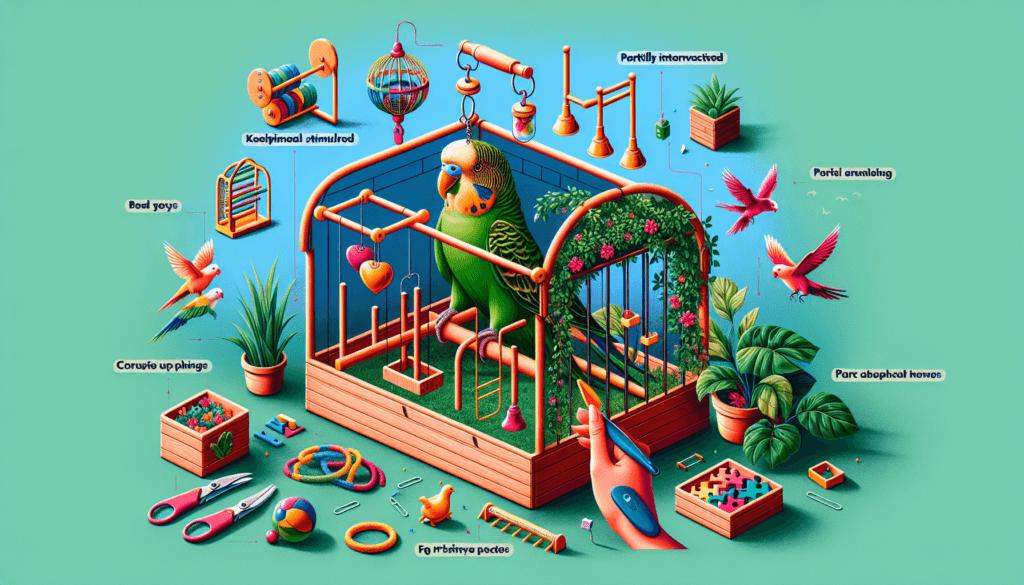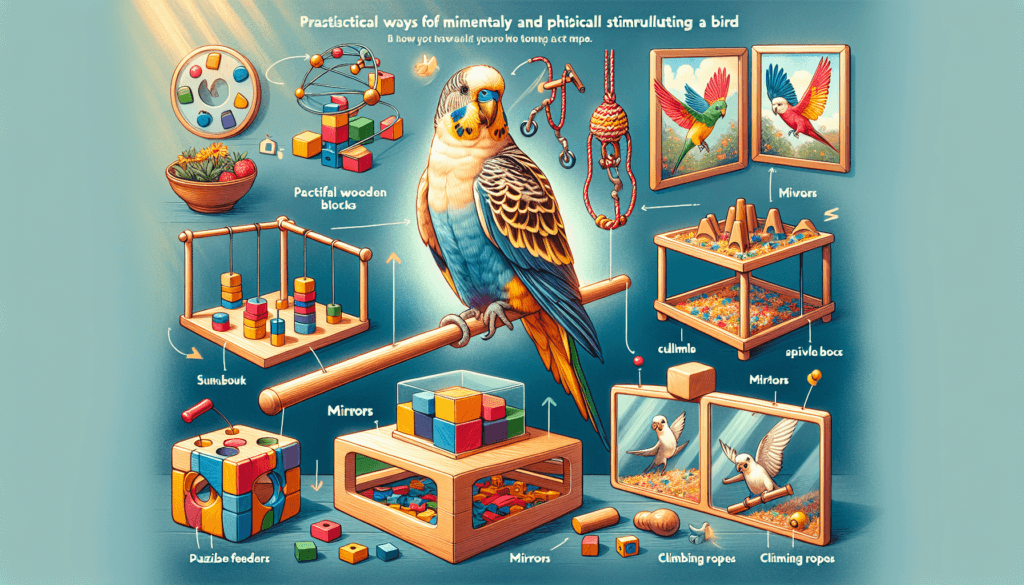As a bird owner, you may find yourself pondering over this question – how can I provide mental and physical exercise for my bird? Birds, just like any other living creature, crave stimulation and physical activity to keep them healthy and happy. Fortunately, there are a myriad of ways through which you can provide both mental and physical exercise for your feathered friend, ranging from interactive toys to enriching their environment. By incorporating these activities into your bird’s daily routine, you’ll not only foster their well-being but also strengthen the bond between you and your beloved pet.

Environmental Enrichment
Provide a spacious and stimulating cage
To promote mental and physical exercise for your bird, it is essential to provide a spacious and stimulating cage. Ensure that the cage is large enough for your bird to move around freely and stretch its wings. This will encourage physical activity and prevent boredom. Additionally, make sure the cage is equipped with various perches and branches for your bird to perch on and explore.
Add perches and natural branches
Adding perches and natural branches to your bird’s cage can provide both mental and physical exercise. Different perches of varying sizes and textures can help promote foot health and strengthen your bird’s muscles. Natural branches also offer a more stimulating and realistic environment for your bird to perch on, as they provide different surfaces and encourage natural behaviors such as climbing and balancing.
Use different types of toys
Toys are essential for environmental enrichment as they offer mental stimulation and encourage physical activity. Provide your bird with a variety of toys, including chewable toys, puzzle toys, and interactive toys. This will keep your bird engaged and prevent boredom. Rotate the toys regularly to keep the environment fresh and exciting for your bird.
Create foraging opportunities
Birds have a natural instinct to forage for their food. By creating foraging opportunities, you can stimulate your bird both mentally and physically. Hide treats or food in foraging toys or puzzles, encouraging your bird to search for and work for its food. This not only provides mental stimulation but also mimics natural foraging behaviors seen in the wild, keeping your bird engaged and entertained.
Social Interaction
Spend quality time with your bird
Birds are social creatures that thrive on companionship. Spending quality time with your bird is crucial for its mental and emotional well-being. Engage with your bird by talking, singing, and playing with it. This one-on-one interaction strengthens the bond between you and your bird, providing mental stimulation and preventing feelings of loneliness.
Consider getting another bird as a companion
If your schedule allows and you have the means to care for another bird, consider getting a companion for your bird. Birds, especially those of the same species, often enjoy the presence of another bird. However, it’s essential to do your research and ensure compatibility before introducing a new bird to your household.
Arrange playdates with other bird owners
Socializing your bird with other birds can be an enriching experience. Arrange playdates with other bird owners to allow your bird to interact with its own kind. This interaction not only provides mental and social stimulation but also gives your bird the opportunity to observe and learn from other birds’ behaviors.

Training and Tricks
Teach your bird simple tricks
Training your bird to perform simple tricks not only provides mental stimulation but also strengthens the bond between you and your bird. Start with basic commands such as “step up” or “wave” and gradually progress to more complex tricks. Use positive reinforcement techniques, offering treats and praise when your bird successfully performs a trick.
Use positive reinforcement
Positive reinforcement is a highly effective training method for birds. Reward your bird with treats, verbal praise, or head scratches when it exhibits desired behaviors or learns new tricks. This encourages your bird to repeat these behaviors and motivates it to engage in further mental and physical activities.
Challenge your bird with puzzles and games
Birds are intelligent creatures that love solving puzzles and playing games. Challenge your bird by providing it with interactive puzzles or toys that require problem-solving skills. This mental exercise not only keeps your bird entertained but also stimulates its cognitive abilities, preventing boredom and promoting overall mental well-being.
Physical Exercise
Allow for regular flight time
One of the most natural forms of physical exercise for birds is flying. Whenever possible, allow your bird to engage in regular flight time outside of its cage in a safe and supervised area. Flying exercises the bird’s wings and muscles, increases its endurance, and provides mental stimulation through exploration and freedom of movement.
Provide bird-safe play gym or playground
Create a bird-safe play gym or playground within your home for your bird to explore and exercise. This can include a variety of climbing structures, swings, ladders, and ropes for your bird to play on. Ensure that all materials used are safe for your bird to prevent any potential hazards.
Encourage climbing and exploration
Birds naturally love to climb and explore their surroundings. Encourage this behavior by providing branches, ropes, and platforms in the cage or play area. These climbing opportunities not only provide physical exercise but also allow your bird to mimic natural behaviors and provide mental stimulation.

Mental Stimulation
Rotate toys and activities regularly
To prevent boredom, it is essential to rotate toys and activities regularly. Introduce new toys while temporarily removing others to keep your bird’s environment fresh and exciting. This stimulates your bird’s curiosity, preventing it from becoming complacent or uninterested.
Introduce new toys and objects
New toys and objects introduce novelty and mental stimulation into your bird’s environment. Provide your bird with a variety of toys made from different materials, shapes, and textures. Novelty not only prevents boredom but also encourages exploration, problem-solving, and physical activity.
Teach your bird to mimic sounds and words
Teaching your bird to mimic sounds and words provides mental stimulation and promotes cognitive development. Interact with your bird daily by speaking and making sounds, gradually encouraging it to mimic your words or sounds. This activity engages your bird’s brain and strengthens its ability to learn and communicate.
Outdoor Time
Offer supervised outdoor time in a secure area
When weather permits, provide supervised outdoor time for your bird in a secure and enclosed area. This experience allows your bird to experience natural elements and stimulates its senses with different sights, sounds, and scents. Ensure the area is safe, free from potential hazards, and escape-proof to prevent any accidents or escape attempts.
Expose your bird to natural sunlight
Natural sunlight is essential for a bird’s physical and mental well-being. When outdoors, ensure that your bird has access to direct sunlight, as it provides necessary vitamins and promotes a healthy feather condition. However, always monitor your bird and ensure it has access to shaded areas to prevent overheating.
Allow your bird to experience different sights and sounds
The outdoors offer a multitude of sensory experiences for your bird. Allow it to experience different sights and sounds, such as the rustling of leaves, chirping of birds, or the sound of nearby wildlife. Exposing your bird to these natural stimuli enriches its environment and stimulates its senses, contributing to its overall mental well-being.

Food Enrichment
Use treat dispensing toys
Utilize treat dispensing toys to provide mental stimulation during mealtime. These toys challenge your bird to work for its food, promoting problem-solving and preventing boredom. Fill the toys with treats or small pieces of food, encouraging your bird to manipulate the toy in order to receive its reward.
Hide food in foraging toys or puzzles
Foraging toys and puzzles are an excellent way to mentally stimulate your bird during mealtime. Hide small portions of your bird’s regular food or treats within these toys, encouraging your bird to search for and work for its food. This engages your bird in a naturalistic behavior and satisfies its foraging instincts.
Offer a variety of fruits, vegetables, and seeds
Providing a varied diet of fruits, vegetables, and seeds is crucial for your bird’s physical health and mental well-being. Offering a wide range of textures, colors, and tastes not only provides essential nutrients but also stimulates your bird’s senses and encourages exploration of different foods.
Music and Audio Stimulation
Play music or audio recordings for your bird
Birds often enjoy listening to music or audio recordings. Experiment with various genres and observe your bird’s reactions. Soft classical music or nature sounds can create a soothing and relaxing atmosphere, while livelier tunes or recordings of other birds can evoke curiosity and excitement.
Provide environmental sounds
Expose your bird to a variety of environmental sounds to enrich its auditory experience. These sounds can include recordings of rain, ocean waves, or other natural elements. Environmental sounds provide a sense of a natural habitat and can help relax or engage your bird, depending on the type of sound played.
Expose your bird to nature sounds
Birds can benefit from listening to the sounds of their fellow avian companions. Play recordings of bird calls or songs to give your bird a sense of being in the presence of other birds. This auditory stimulation can be both calming and mentally engaging for your bird.

Toilet Training
Teach your bird to use a designated toilet area
Toilet training your bird can be a beneficial and hygienic practice. Designate a specific area of your home or the cage as a toilet area for your bird. Use positive reinforcement, such as treats or praise, when your bird uses the designated area correctly. Consistency and patience are key to successfully toilet training your bird.
Reward your bird for using the toilet correctly
Rewarding your bird for using the designated toilet area correctly reinforces positive behavior and encourages repetition. Offer treats or verbal praise whenever your bird eliminates in the designated area. With time and consistent reinforcement, your bird will learn to associate the toilet area with positive rewards and prefer using it.
Regular Veterinary Check-Ups
Schedule regular check-ups with an avian veterinarian
Regular veterinary check-ups are crucial for maintaining your bird’s physical well-being. Avian veterinarians specialize in bird health and can provide necessary vaccinations, check for any signs of illness, or offer dietary and behavioral advice. Schedule regular check-ups to ensure your bird remains healthy and receives the proper care it needs.
Ensure your bird’s physical well-being
Physical well-being is essential for your bird’s overall health and happiness. Ensure that your bird’s nutrition, cage setup, and exercise routine are all conducive to its physical well-being. Regular check-ups with an avian veterinarian can help identify and address any physical issues, ensuring that your bird receives the necessary care and treatment.


